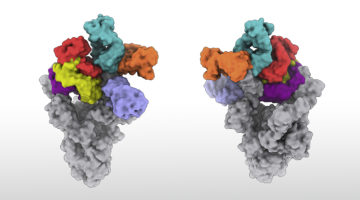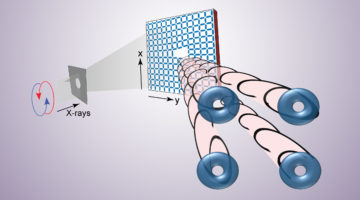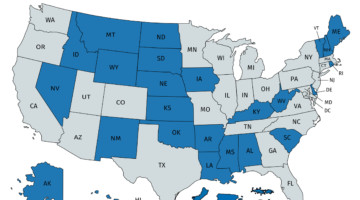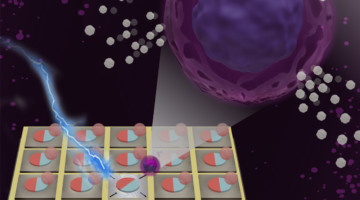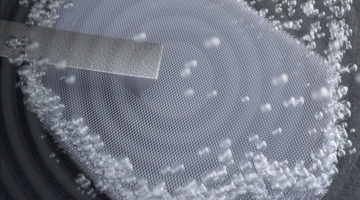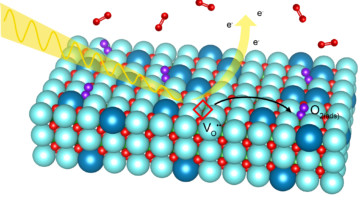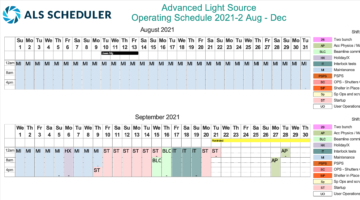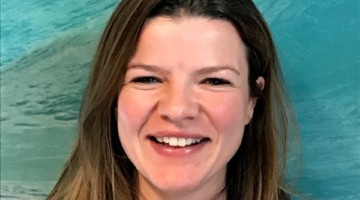Protein-structure studies helped demonstrate that the primary target of antibody-based COVID-19 immunity is the part of the virus’s spike protein that can most easily mutate. The work anticipated the rise of SARS-CoV-2 variants and guides the selection of antibody therapeutics that are likely to be more resistant to immune escape. Read more »![]()
![]()
ALSNews Vol. 427
May 26, 2021
Artificial Spin Ice Toggles Twist in X-Ray Beams on Demand
ALS studies helped scientists understand how a nanoscale magnetic lattice (an artificial spin ice) acts as a toggle switch for x-ray beams with spiral character. The findings represent an important step toward the development of a versatile new tool for probing or controlling exotic phenomena in electronic and magnetic systems. Read more »![]()
![]()
EPSCoR Collaboration Fosters New Research and New Careers
The DOE Established Program to Stimulate Competitive Research (DOE EPSCoR) encourages partnerships between national labs and researchers in qualifying states and territories. An EPSCoR collaboration with researchers from Kentucky has resulted in an ALS highlight, career advancement for young scientists, and a larger, center-scale proposal. Read more »
Programmable Micromagnets for Single-Cell Sorting
Researchers demonstrated that electrically induced mechanical strain can control the magnetic state of tiny magnets used to sort biological cells. The work lays the foundation for a programmable, single-cell sorting platform to support a wide variety of biotechnology applications, including personalized cancer treatments. Read more »![]()
![]()
New Tools Link Catalytic Activity to Nanoscale Transformations
Transitioning to a clean hydrogen economy will require cheaper, more efficient ways to split water molecules. To address bottlenecks in the water-splitting process, researchers developed a suite of advanced tools, including a liquid flow cell that enables electrochemical studies of catalysts under working conditions. Read more »
Scientists Uncover a Different Facet of Fuel-Cell Chemistry
Solid oxide fuel cells are a promising technology for cleanly converting chemical energy to electrical energy. To improve the efficiency of these devices, researchers studied a model electrode material in a new way—by exposing a different facet of its crystal structure to oxygen gas at operating pressures and temperatures. Read more »
Angelic Lucero, Accelerator Operator Specialist
Working at the ALS started out as a summer job in college for Angelic Lucero—and then she never left. She gives us a glimpse into all the details our operators need to monitor and talks about efforts to help new people at the Lab access resources. Read more »
Operating Schedule Updates
The operating schedule for the 2021-2 cycle will be published in a few days. The summer shutdown will begin July 3 and run into September. More information on subsequent shutdowns is anticipated by early fall. The most up-to-date information on the current schedule and future outlook can always be found on the Operating Schedule web page. Read more »
Call for 2020 and 2021 Publications
All publications resulting from work done in whole, or in part, at the ALS must be recorded by the User Office for the Department of Energy (DOE). Please help ensure our records are complete by reporting your ALS publications, especially those published in 2020 and 2021. Read more »
Sophie Morley to Speak at Berkeley Lab 90th Anniversary Event
Throughout 2021, the Berkeley Lab community is celebrating the past and imagining the future. ALS Research Scientist Sophie Morley will be featured in the 90th Anniversary Speaker Series event taking place on Friday, May 28, at 12:00 P.M. Pacific, so join us online to hear more about how the ALS enables science around the world. Read more »
